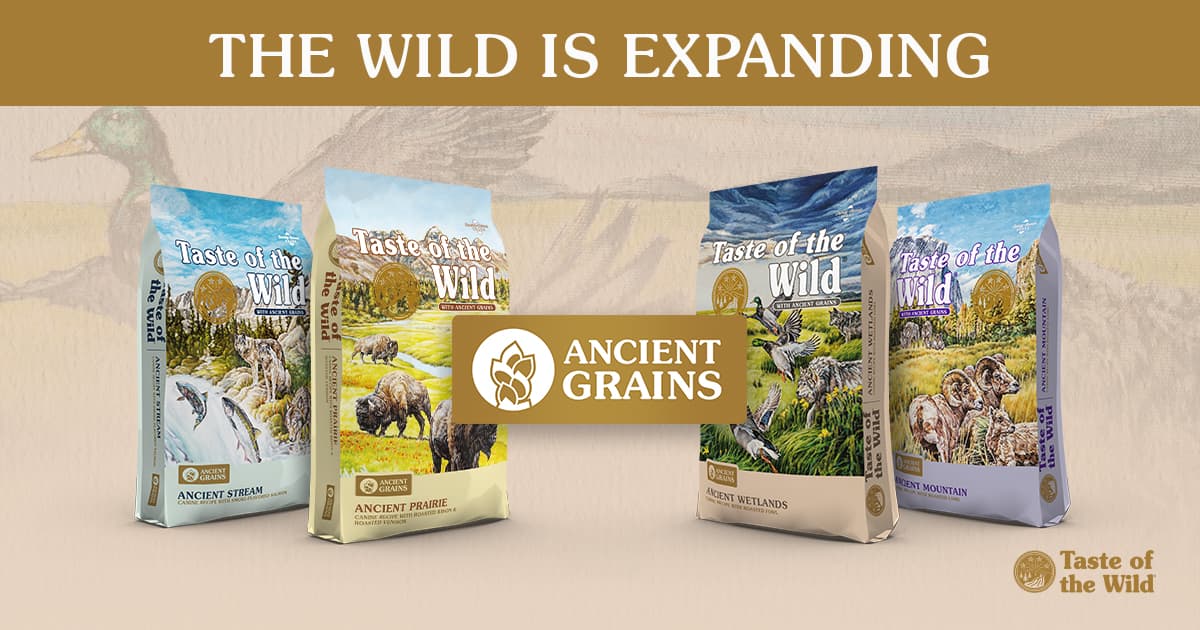Pet parents who prefer to feed their dogs a grain-inclusive diet have a new option, Taste of the Wild with Ancient Grains. The new line of dry dog foods combines the same flavorful meats found in the original Taste of the Wild recipes with a special blend of four ancient grains: grain sorghum, millet, quinoa and chia seed.
The four Taste of the Wild with Ancient Grains recipes are:
- Ancient Stream Canine Recipe with Smoke-Flavored Salmon
- Ancient Prairie Canine Recipe with Roasted Bison & Roasted Venison
- Ancient Wetlands Canine Recipe with Roasted Fowl
- Ancient Mountain Canine Recipe with Roasted Lamb
Like Taste of the Wild and Taste of the Wild PREY recipes, Taste of the Wild with Ancient Grains Canine Recipes provide your dog with the complete and balanced nutrition you’ve come to expect — all while reflecting your pet’s ancestral diet.
The #1 ingredient is still real meat, fish or fowl. That’s because dietary protein is so important to your dog’s health. Meats are concentrated sources of amino acids, including those that dogs must get from food. Each Taste of the Wild with Ancient Grains Canine Recipe is formulated with combinations of salmon, duck, buffalo, pork and lamb from trusted suppliers.
But Taste of the Wild with Ancient Grains doesn’t stop there.
Ancient grains are packed with protein, fiber, essential fatty acids and other key nutrients. Quinoa, chia seed, grain sorghum and millet were specifically chosen for their superfood reputations and nutritional contents, which include quality protein.
- Quinoa is higher in protein, fat and fiber than conventional grains (e.g., corn and wheat). In fact, it has substantially more fiber than other grains. This super-seed provides iron and has relatively high levels of the essential amino acids lysine and arginine; magnesium, a key mineral for normal nerve and muscle function and strong bones; and riboflavin (vitamin B2), which helps the body convert nutrients to energy. More than 50 percent of the fatty acids in quinoa are linoleic acid, an essential omega-6 fatty acid that’s important for skin health.
- Chia seed is rich in protein, dietary fiber and fat, much of which is the essential omega-3 fatty acid alpha-linolenic acid (ALA). Most of the dietary fiber that chia provides is insoluble fiber, which is important for healthy digestion and waste removal.
- Millet provides a balance of soluble and insoluble fiber and digestible protein that’s rich in methionine, an essential amino acid that dogs use to make taurine. In addition, millet is high in B vitamins, iron and vitamin E, an antioxidant that helps protect your dog’s body from damage caused by free radicals.
- Grain sorghum is rich in antioxidants, dietary fiber, several B vitamins, iron and zinc. In addition, the starch in sorghum is digested more slowly and has a lower glycemic index compared to conventional grains.
Collectively, these quality ingredients provide the amino acids and fatty acids your dog needs for strong muscles, normal organ and immune system function, healthy skin and shiny coat.
Probiotics provide digestive and immune system support. Healthy digestive and immune systems are vital to your dog’s overall health. That’s why every Taste of the Wild dry dog food recipe is enhanced with our proprietary K9 Strain Probiotics, a species-specific blend of beneficial bacteria developed for use in our dog foods. Each pound of Taste of the Wild with Ancient Grains is guaranteed to provide 80 million live, active cultures to support healthy digestion and immune system activities.
Taste of the Wild with Ancient Grains provides nutrition for all life stages. From puppy to adult to senior, these new canine recipes are formulated to meet the nutritional needs of dogs at any age and life stage, including large breed dogs (70 pounds or more as adults).
To learn more about each of the Taste of the Wild with Ancient Grains Canine Recipes, visit the formula finder.
RELATED POST: A Pet Nutrition Primer: 7 Things You Should Know
The information in this blog has been developed with our veterinarian and is designed to help educate pet parents. If you have questions or concerns about your pet's health or nutrition, please talk with your veterinarian.

